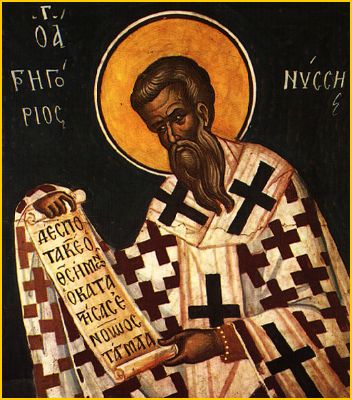|
|||
|---|---|---|---|
| This weekly bulletin insert complements the curriculum published by the Department of Christian Education of the Orthodox Church in America. This and many other Christian Education resources are available at http://dce.oca.org. | |||

Gregory of Nyssa was a saint who probably preferred solitary thought, study and prayer to public preaching and lecturing. Yet he was called to both public and private activity in his life. Born in 335 in Caesarea, Cappadocia, Gregory was one member of a family that produced an extraordinary number of saints. He grew up thinking, hearing and speaking about theology and was profoundly influenced by his older brother Basil, known to us as Basil the Great, and by their friend Gregory of Nazianzus. With his solid theological background, Gregory was ready as an adult to write about deep and complex Church teachings in ways that people could understand. This became especially important when the doctrine of the Trinity was questioned and argued about. Gregory explained that God is One in three undivided Persons who always work together. Part of what he said has been expressed in this way: "Every operation which extends from God to the Creation...has its origin from the Father, and proceeds through the Son, and is perfected in the Holy Spirit." He also said, "Whatever comes to pass does so by the action of the Three. But what comes to pass is one thing, not three things." In addition to defending and explaining the faith in public, Gregory was, despite his reluctance, appointed Bishop of Nyssa by his brother Basil in the year 372. Basil knew his younger sibling was not altogether suited to such a public administrative role, but he needed someone he could depend on. As a bishop, Gregory had to deal with the false teachings of the Arians, who constantly challenged him. Seeking to damage his reputation, they accused him of financial mismanagement and got him removed from his episcopal see, and even banished for a time. Though the false charges were dropped, the experience of such publicly-expressed hostility was hurtful and embarrassing. He was able to come back to his diocese a few years later, and because the necessity was so great, he continued to defend the faith against the Arians in public. He attended the Ecumenical Council of Constantinople in 381, and preached on special occasions. But he turned down the opportunity to become bishop of the important area of Sebaste.
Gregory needed his private time to produce his great theological works. In addition to his writings on the Trinity, he completed Basil's sermons on the six days of creation (unfinished at Basil's death in 379) and gave the world a thorough outline of theology, the "Address on Religious Instruction." There were many other works as well, including mystical writings like the "Life of Moses" which compares the Hebrews' wilderness journey to Mount Sinai to the human soul's journey through this difficult life to a vision of God. Gregory did not choose public life, and it didn't bring him success. Yet its challenges spurred him to use his private hours for the creation of theological works that were, and still are, basic to the understanding of the Orthodox faith. |
|||
